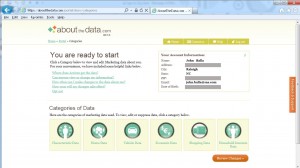
The issue of data privacy has gotten a lot of attention lately, thanks in part to revelations by Edward Snowden and his kiss-and-tell with the press about several top-secret United States and British government mass surveillance programs. It doesn't matter that this is not a new issue, nor that his revelations specifically detail government intelligence programs (not commercial) - they affect the public's perceptions about data gathering and use. For that reason alone, marketers should care about it.
As we've addressed extensively in this blog, big data and customer analytics are essential ingredients for marketing in the digital age. Most especially, they hold the potential for marketing to realize its rightful place in the enterprise for fostering a customer-centric strategy that drives every organization's ability to fulfill its mission to create value.
But individual consumers are not universally thrilled about the idea of people collecting their data and using it, and rightfully so. Not so long ago, the fall of the Berlin Wall shed light on the domestic surveillance programs that governments behind the iron curtain used to maintain control over its people - now publicly detailed in places like Budapest's House of Terror museum. Sadly, there are other places in the world where that kind of institutional malfeasance continues today as reminders of how bad it could be.
 On the commercial front, the marketing services provider Acxiom made a bold move by launching aboutthedata.com, which gives people the ability to see and edit their own data in the Acxiom databases.
On the commercial front, the marketing services provider Acxiom made a bold move by launching aboutthedata.com, which gives people the ability to see and edit their own data in the Acxiom databases.
Lauded by some and derided by others, it was a unilateral development that addresses some of the threat that government regulation may ensue in response to mounting calls to restrict the ability to gather and use consumer data. Some of that public pressure comes from the annoyance factor of "junk mail" and telemarketers calling at inopportune times, partly addressed by DMAChoice, an online tool by the Direct Marketing Association that lets you opt-out of "junk mail."
I love what Acxiom and the DMA are doing, but they are just two of many such organizations. Will the others follow suit? There's no telling, but I certainly hope so. And it's not so much the threat of regulation to worry about, but it's losing the trust of our customers that should be the main concern - which is already a shaky proposition for many. My colleague, Jonathan Moran, shared his views on Acxiom's move in DM News this week, calling attention to the benefit of helping marketers be better, and he's certainly right about that.
But I think Moran is hinting at a broader - and more important issue - that marketers have an obligation to be better at what they do. Even beyond the publicly-available or self-reported data of the Acxiom database variety, the digital nature of today's world gives us the ability to gather and use behavioral data - the "actions speak louder than words" variety of data. The drawback is that behavioral data is where the danger to become creepy lies, but on the other hand it's where the potential lays waiting to deliver epic experiences. The path we choose (creepy or epic) is our decision and the time to make the choice is now. And we're kidding ourselves if we think we'll make the choice without the full knowledge, consent and involvement of our customers.
Let's show them they can trust us with their data. Stop spamming. Go beyond tip-toeing around opt-outs and make use of opt-ins. Give your customer good reasons to let you have and use their data. Paint a picture of how epic it will be for them. Want a good starting point? Download this whitepaper, How Vail Resorts Creates Epic Experiences with Customer Intelligence. I promise we won't abuse your data when you register for the paper, and yes, it's worth reading.
